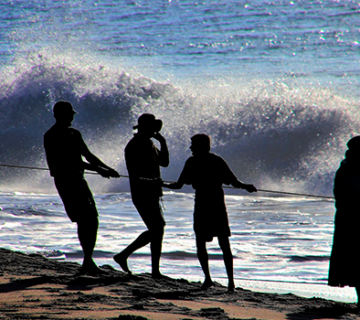 It’s like being hit below the belt. That’s the impression you get when you read the book The Futility of War. It sweeps you away with such powerful eloquence that you find yourself with your back against the wall. The experience is even more dramatic when you think that these pages were written exactly 50 years ago. Their author is Igino Giordani (1894-1980), politician, journalist, writer and eminent Italian figure in the Catholic Church and in his country.
It’s like being hit below the belt. That’s the impression you get when you read the book The Futility of War. It sweeps you away with such powerful eloquence that you find yourself with your back against the wall. The experience is even more dramatic when you think that these pages were written exactly 50 years ago. Their author is Igino Giordani (1894-1980), politician, journalist, writer and eminent Italian figure in the Catholic Church and in his country.
Citta’ Nuova publications has reprinted Giordani’s book (Rome 2003, 116 pages) at a moment in time when people are in need of words that ring true, clear and essential.
The preface affirms that certain works manage to be constantly timely. Even if their roots lie in specific problems, their teachings cut across existing historical conditions, serving people of every age and in all places. It was based on this very observation that Citta’ Nuova decided to reprint Giordani’s book, originally written in 1953 when geopolitical positions were beginning to freeze, and the division of consciences was crystallizing as a result of the Cold War.
Today, this text allows you the benefit of hindsight, as if you were holding in hand, once it’s all over, a piece of the Berlin Wall. It is an experience of enormous historical and political importance. Moreover, in these very difficult times the book hits you hard in the stomach because it demonstrates the futility of war as well as its intrinsic and evident stupidity. Make no mistake: Giordani knows exactly what he’s talking about. He was on the battle front and was awarded a medal for his valor in the catastrophe we know as World War I. He does not speak unwarily, nor out of cowardice, a trait people are usually and ridiculously accused of when they take the side of peace. Come to think of it, the truly courageous are the peacemakers, not those who protect themselves with missiles, cannons, guns and the like. Undergirding his arguments, Giordani clearly affirms that peace is the result of a work knit together with patience and earnestness. It takes much more than a kind word, and it is more than a shield held up to protect hidden interests.
Reading these 100 pages is overwhelming precisely because it seems they were written this morning, not 50 years ago. History is a “teacher of life” they say. It’s a pity human beings are such bad students. Giordani’s first sentence is riveting. You immediately reach for a pencil to underline it: “War is wide-scale murder”. And Giordani points his finger at the rhetoric, lies and interests which accompany all conflicts wherever they are fought: “Just as the plague spreads the plague, and hunger can lead to starvation, so does war serve to kill.” Period.
You look up from the pages with a sense of pride. Yes, my dear young Catholic, you feel proud to belong to a culture formed by people of such stature. Giordani was no loner. He was neither foolhardy nor a counter-culturalist. He was one of the protagonists of the Catholic world who – though they may have been forgotten today – contributed decisively to promoting the Italian nation with initiatives that gave life and hope. It is fascinating to know the thinking of men who are so close to us and are so spiritually rich that their words are never outdated.
Based on his experience on the battle front, he confirms the futility of war
Giordani’s book is so fascinating it’s hard to put it down. After a few pages you have to sharpen your pencil because you’ve worn it out underlining every other sentence. The author is controversial, a born controversialist, and yet he is also a brother to every person, even to those whose thinking is diametrically opposed to his. He does not offend the human person, but having fought on the battle front, he hurls himself against war, anxious to show how futile it is. He is unflinching in this.
Giordani has a very personal way of expressing himself, convincing and passionate. Evidently, his style is born out of his desire to communicate ideas. He seems to be on a permanent mission. You find him at the very heart of the Church. He is not simply a writer; he is much much more. He knows the right words to use and, when needed, he invents tantalizing expressions. His language is typical of the mystics and his words echo the Fathers of the Church. His book is a book of history, of life, of prayer.
It is a book that refuses attitudes of resignation in the face of decisions made by men of power. Giordani sustains that every person must be on the front lines for peace. “If you want peace, prepare for it”. This is his noble message meant for people of every category. “Only crazy people, or the incurable wish for death”, he writes, “and war is death.” It is not the people’s wanting. It’s the wanting of the minority for whom physical violence grants them the assurance of economic gains or appeals to their baser instincts. Today, more than ever, with its cost, death and disaster, war proves to be “useless slaughter”. “Slaughter, and – worse – a useless one.” These last words are of Pope Benedict XV. Giordani drinks fully of the Church’s magisterium, and throughout the whole book he never loses sight of the accomplishments of Peter’s successors.
Giordani affirms that war is always a defeat, even for the victors. The money invested in war could be used to solve such dramatic problems as hunger and poverty, and to find cures for illnesses that plague humanity. It’s a matter of justice. Thus none of the thousand pretexts (they are always the same, anyway) used to justify war are valid. Neither is the promised “swiftness” of military operations a good “excuse”. At this point, Giordani becomes scornful as he recalls how, in Hitler’s opinion, World War II would have been merely a blitzkrieg, and, as Salandra stated, World War I should have been “a walk”. Giordani continues impetuously: “I believe no head of State has ever admitted he was waging war for motives of plunder; everyone held that it was being fought for the most noble of reasons, for altruistic and idealistic purposes, of course. And – just to show how childish hatred can get – greed is a characteristic of the enemy while a friend shows idealism.
Overturning the macabre prospective of historiography
Logic holds that those who wage war are in the wrong; it solves nothing and – in the end – they are the losers. The people do not want it, and it is a grave mistake to indulge in the biographies of those who have unleashed unspeakable massacres, like Hitler and Stalin, while ignoring the true leaders of humanity such as Cottolengo or Don Orione, Giordani writes. It is our cultural duty to overturn this macabre perspective of historiography.
Giordani points to the way of dialogue – at all times and in any situation – as the way to find solutions. He affirms that misery and greed are the principal causes of war, whose roots are in fear. But there does exist a hope and an alternative: it’s called charity, which Christ incarnated, He who also redeemed politics in order to make it function in favor of peace and life. “Enemies are to be loved,” Giordani writes. “If only the politics of charity were to take root. We would discover that it coincides with the most enlightened rationality and, in the economic and social sense, it would prove to be a real bargain.”
Giordani defines any war as a crime, be it an act of aggression or prevention. In actuality it is an act against justice because true justice brings forth true peace. He goes on to raise us to sublime spiritual heights with his references to St. Francis and Dante. “For Christians to be worthy of being called ‘children of God’ they have to work for peace”, he states. And this must be done without trepidation, by living out the ministry of reconciliation, breaking down walls of separation, forgiving all those who do us harm, leading those who are far back to the fold of unity. Giordani also cites Max Josef Metzger who was killed by the Nazis in 1944: “We must organize peace as others have organized war”. It is neither serious nor credible to speak of peace while preparing for war.
Giordani concludes, “The work of building peace starts from you and from me”. To do away with war it is not enough to eliminate arms; we need to rebuild a consciousness, a culture of peace. It is a most urgent task which people of faith should accompany with a strategy of prayer. This is the mission of Christians today: to bring about the Gospel of Peace.
GIAMPAOLO MATTEI


 Italiano
Italiano Español
Español Français
Français Português
Português


